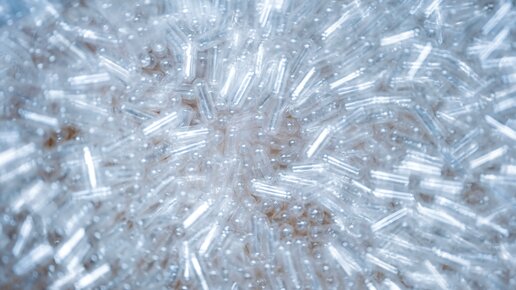Frankincense, also known as Olibanum, is a resin that has been prized for thousands of years and is obtained from the trees of the Boswellia genus. Frankincense is becoming increasingly popular as a food supplement. The main active ingredients, the so-called boswellic acids, have various health-promoting properties. But how does frankincense work exactly and what should be considered when taking it?
Definition: Boswellia supplementation
Indian frankincense (Boswellia serrata) as a dietary supplement is mainly offered in the form of capsules or tablets (although capsules have the advantage over tablets that they do not require unnecessary binding agents and other additives). These contain the plant resin from the Boswellia trees – also known as the salai tree. The resin is obtained by cutting the bark of the tree, allowing a sticky substance to escape, which hardens in the air and is finally processed into frankincense. The trees of the Boswellian genus are mainly found in the dry regions of India and Pakistan.
Food supplements based on the precious resin of the frankincense tree usually contain standardised levels of Boswellia acids – the main active ingredients in frankincense. These Boswellia acids are considered to be the active ingredients of frankincense.
Frankincense and its effects: Boswellia for health
The key ingredients in Indian frankincense, boswellic acids, play a central role in its effects on health. The focus is particularly on its anti-inflammatory properties, which is why frankincense is increasingly being used in modern medicine as a natural supplement for the treatment of inflammatory diseases, such as arthritis, rheumatism or Crohn's disease.
In recent years, modern science has also embraced the healing properties of this traditional Ayurvedic plant. Scientific studies indicate that boswellic acids can have an anti-inflammatory effect as well as antioxidant and analgesic effects.
Anti-inflammatory properties
One of the best documented effects of frankincense is its anti-inflammatory properties. Studies have shown that Boswellia extracts can reduce inflammatory reactions in the body by inhibiting the production of pro-inflammatory messengers. This makes frankincense particularly interesting for people who suffer from chronic inflammatory diseases, such as:
- Rheumatoid arthritis: Some clinical studies have shown that taking Boswellia extracts regularly can alleviate the symptoms of rheumatoid arthritis such as joint pain and muscle or joint stiffness. Frankincense can help relieve pain and improve mobility and quality of life.
- Crohn's disease, ulcerative colitis and chronic colitis: Frankincense has also shown positive effects in inflammatory bowel diseases such as Crohn's disease, chronic colitis and ulcerative colitis. Some studies suggest that the concomitant intake of the traditional plant can help to reduce inflammation in the intestine and thus alleviate symptoms such as abdominal pain, diarrhoea and cramps.
- Asthma: The positive effect of Boswellia extract in asthma treatment is also due to the anti-inflammatory properties of the Boswellia acids. Studies show that frankincense can significantly improve the symptoms and objectively measured lung and immune functions. In addition, it has been shown that the need for inhalation therapy could be reduced.
Antioxidant effect
In addition to its anti-inflammatory properties, frankincense also has antioxidant effects that can help neutralise free radicals in the body. Free radicals are highly reactive molecules that can damage cells and that promote ageing and disease development. Antioxidant substances, such as Boswellia acids, help the body counteract these harmful molecules, protecting cells from oxidative stress.
Pain-relieving effect
The anti-inflammatory properties of frankincense can also contribute to the relief of pain. Especially in the case of pain caused by inflammation, frankincense can be a natural addition to classic painkillers.
Supporting the immune system
Studies indicate that frankincense also has an immunomodulatory effect. This means that Boswellia extracts can support the immune system by balancing the immune response – that is, regulating both overactive and underactive immune reactions.
Cholesterol-lowering effect
A 6-week treatment with frankincense showed positive effects on the blood values of the participants in a study. A significant increase in HDL cholesterol and a remarkable reduction in total and LDL cholesterol were observed. Research is currently being conducted into the possible positive effect of incense on blood pressure.
Use of boswellia capsules, etc.
Frankincense is available in various pharmaceutical forms, but most commonly as capsules, tablets or powder. However, tablets generally contain not only the active substance, but also technical excipients and additives that are necessary for fully automated production. This includes binding agents that ensure the strength and cohesion of the tablet. In addition, other excipients, such as so-called explosives, are often used to ensure that the tablets dissolve in the gastrointestinal tract.
The recommended dosage of frankincense extracts may vary depending on the product and purpose. Most products contain between 300 and 500 mg of extract per capsule. Above all, however, their content of Boswellia acids is decisive. High-quality food supplements use standardised extracts that always contain a precisely defined concentration of Boswellia acids. The following applies: The more Boswellia acid an extract provides (e.g. 70% Boswellia acids), the better.
Intake of boswellia
Boswellia capsules should ideally be taken with meals to ensure better tolerability. Since frankincense is fat-soluble, taking it with a fatty meal can improve bioavailability and optimise the absorption of Boswellia acids in the body.
Boswellia side effects
In general, boswellia is considered to be very safe and well tolerated. In the usual recommended doses, mild side effects (skin redness, gastrointestinal intolerance) occur only rarely.
However, boswellia intake cannot be recommended for children, as well as pregnant and breastfeeding women, because there are still insufficient studies on safety in these life phases.
Frequently asked questions about boswellia
Frankincense is most commonly taken in the form of capsules containing standardised Boswellia extract. The recommended dose is usually 400-100 mg extract per day. For better tolerability and bioavailability, frankincense should ideally be taken with meals, as it is fat soluble and is better absorbed in combination with a meal containing fat.
Frankincense is known for its anti-inflammatory, analgesic and antioxidant properties. Accordingly, the extract is often used to support chronic inflammatory diseases such as arthritis, Crohn's disease and ulcerative colitis. In addition, frankincense can also contribute to the relief of joint pain and to the promotion of general immune function.
When and whether the effect of frankincense is noticed depends on the personal situation. However, studies show that an effect of the extract is to be expected after approximately four weeks of regular intake.
Initial positive effects such as a reduction in inflammation and pain relief can often be felt after about two to four weeks.








